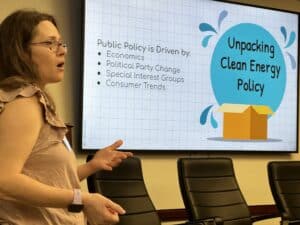This course will take place both in-person (2 Saturdays in Cayce, SC) synchronously and asynchronously online over 9 weeks in January, February and March 2024. (See detailed calendar below).
Saturday, January 13th, 2024
8:30 am- 4:30 pm. – Cayce, SC
- Syllabus review
- Course overview
- Economic history of technology and energy transitions- Industry 20,50, 100 years ago?
- Guest speaker- Is decarbonization real?
Tuesday, January 16th
Synchronous Zoom session, 6:30-8:30 p.m.
- Guest lecture on the path to a clean energy future
- Discussion of key principles; resilience, reliability, sustainability, and market structure
Asynchronous participation: Watch The Day After Tomorrow movie and complete discussion board.
Tuesday, January 23rd
Synchronous Zoom session, 6:30-8:30 p.m.
- What are the energy choices?
- Will markets get us there?
- Decision making analysis 101.
- The imperfection and beauty of markets 101
Asynchronous participation: Copper and the dark side of the Energy Transition- Documentary
Tuesday, January 30th
Synchronous Zoom session, 6:30-8:30 p.m.
- Guest lecture on energy markets and the electric grid- the case of Texas.
- Discussion: What is the Electric Grid?
- Is the grid ready for these energy transitions?
- How do we make sure it is ready
Asynchronous participation: Podcast review and discussion on the economics of nuclear power. Freakonomics Radio: Nuclear Power Isn’t Perfect. Is It Good Enough?
Tuesday, February 6th
Synchronous Zoom session, 6:30-8:30 p.m.
- Discussion on technology and policy path dependency, adaptation, and dominant technologies. What technology will win the day?
- What about technology adoption?
- Guest lecture on the role of electric vehicles in electrification?
Asynchronous participation: Independent reading:
- MIT – The Future of Solar
- MIT- The Future of Energy Storage
Tuesday, February 13th
Synchronous Zoom session, 6:30-8:30 p.m.
- What are the real choices? Coal, Nuclear, Natural Gas, Wind, Solar etc.?
- National and global market and policy forces and the drive to change.
- Coal as a case on the intersection of national and global market forces, shifting demand across markets, policy pressures and more.
Asynchronous participation:
- Team meetings for final presentations and independent research.
- Meetings with Dr. Dickes and coaches
Tuesday, February 20th
Synchronous Zoom session, 6:30-8:30 p.m.
- Examine the winners and losers of electrification, tradeoffs, and unintended consequences.
- Why are so many public goods monopolies or oligopolies?
- What are the costs of benefits of this type of marker for consumers?
- How does market consolidation fit within the current energy transition.
Saturday, February 24th
8:30 am- 3:00 pm, Cayce, SC
- Guest Panel on Electrification
- Team Presentations and discussions
- Can collaborative governance help us get there?
Tuesday, February 27th
Synchronous Zoom session, 6:30-8:30 p.m.
- Guest Speaker on Wind Energy in the SE.
- The changing footprint of renewables.
March 3-9th
- Asynchronous participation and individual consultation with Dr. Dickes
All final assignments due
Saturday, March 9th
